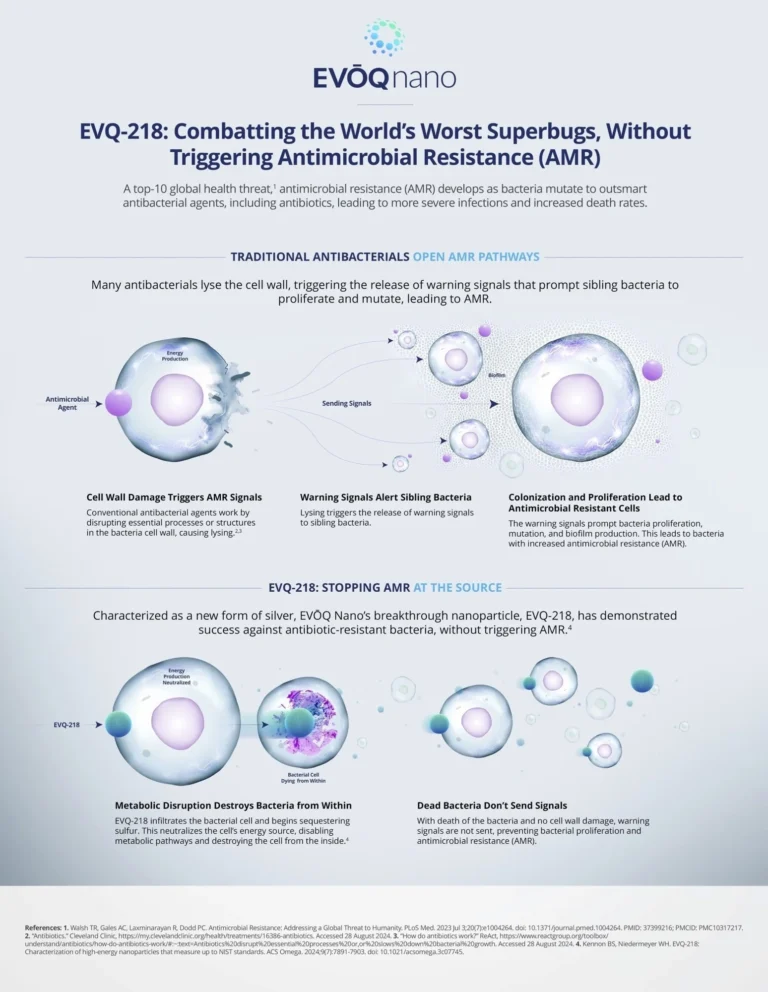
As the United Nations (UN) prepares to address the escalating threat of antimicrobial resistance, EVŌQ Nano is helping raise awareness through an educational infographic depicting a common trigger of antimicrobial resistance and highlighting EVQ-218's novel mechanism of action.

Antimicrobial resistance (AMR) — considered a top 10 global health threat — occurs when bacteria mutate to outsmart antibacterial agents, including antibiotics, leading to more severe infections and higher mortality rates. The UN General Assembly high-level meeting on AMR presents a critical opportunity for global stakeholders to address the growing threat.
Combatting Pulmonary Bacterial Infections
Bacteria’s ability to form biofilms is a key factor in their resistance to antibiotics. Biofilms are protective layers that shield bacteria from therapeutic interventions and the body’s immune system, especially in conditions like cystic fibrosis where infections become entrenched deep within the lungs.
Pulmonary therapeutics face hurdles in reaching the lower respiratory passages due to the lungs’ complex structure, mucus production, and natural clearance mechanism, which expels foreign particles. Recent preclinical trials of EVQ-218 show promise in addressing these challenges.
- In rodent studies, EVQ-218’s uniform, sub-10 nm nanoparticles effectively penetrated the distal regions of the lungs, overcoming typical delivery barriers. This deep lung penetration, combined with data showing efficacy against biofilm formation, positions EVQ-218 as a promising candidate for tackling difficult-to-treat infections.
- Serial passage assays, a critical test to assess the development of drug resistance over time, have also been conducted on EVQ-218. The results showed no development of resistance in 28-day and 35-day testing. Resistance to other antibiotics typically occurs in 4-5 days.

Advancing Toward Clinical Trials
EVŌQ Bio, a wholly-owned subsidiary of EVŌQ Nano, received two grants from the Cystic Fibrosis Foundation to develop an inhaled therapeutic using EVQ-218 to combat pulmonary bacterial infections associated with cystic fibrosis. The company recently completed a successful Pre-Investigational New Drug (pre-IND) meeting with the U.S. Food and Drug Administration and is confidently advancing toward Phase I clinical trials.
EVQ-218 has been characterized as a new form of silver by the Journal of the American Chemical Society, ACS Omega. Unlike conventional antibacterial agents that often trigger AMR by rupturing bacterial cell walls, EVQ-218 employs a novel mechanism of action that kills bacteria from the inside.
- EVQ-218 infiltrates the bacterial cell and begins sequestering sulfur. This neutralizes the cell’s energy source, disabling metabolic pathways and destroying the cell from the inside.
- With death of the bacteria and no cell wall damage, warning signals are not sent to sibling bacteria, preventing bacterial proliferation and AMR.
In vitro studies found EVQ-218 demonstrated efficacy against a range of pathogens, including the top six antibiotic-resistant strains identified by The World Health Organization.
- Acinetobacter baumannii, CR
- Pseudomonas aeruginosa, CR
- Escherichia coli, 3GCR
- Klebsiella spp., 3GCR
- Klebsiella spp., CR
- Enterobacter spp., SGCR